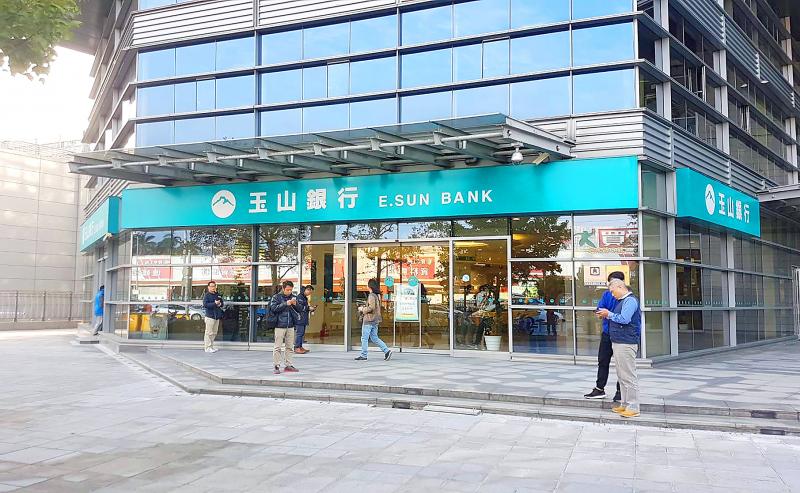E.Sun Commercial Bank (玉山銀行) and Hua Nan Commercial Bank (華南銀行) on Tuesday said that they would make all of their branches bilingual by 2026, with their employees proficient in English.
E.Sun Financial Holding Co (玉山金控) wholly owns E.Sun Bank, which has 139 branches in Taiwan, while Hua Nan Financial Holding Co (華南金控) owns Hua Nan Bank, which has 186 branches.
Since last year, the Financial Supervisory Commission (FSC) has been pushing local banks to become bilingual in a bid to boost the competitiveness of the banking sector.

Photo: CNA
The commission has said that 15 banks in Taiwan have made 69 branches bilingual.
E.Sun Financial president Magi Chen (陳美滿) said that the bank so far has 17 bilingual branches.
One of its bilingual branches is in Kaohsiung’s Zuoying District (左營), close to the Taiwan High Speed Rail’s Zuoying Station, an area with a major department store and an American school, Chen said, adding that the branch has recorded a bank record for the number of foreign-exchange transactions and new accounts opened by foreign clients.
Next year, E.Sun Bank is to model 13 more branches on the Zuoying branch to achieve its 2026 goal, Chen said.
E.Sun Bank said that with 28 outlets in nine foreign markets, it has 2,663 employees who possess foreign-language proficiency certificates.
Hua Nan Bank, which has 11 bilingual branches in Taiwan, expects to increase that number to 100 over the next two years to reach its 2026 goal, Hua Nan Financial chairman Derek Chang (張雲鵬) said.
Hua Nan Bank has also installed the first artificial intelligence clerk in Taiwan, which can communicate in English with foreign clients, Chang said, adding that it can also provide services outside business hours.
Hua Nan Bank is forming a bilingual seed team that can train employees in central, southern and eastern Taiwan so that they are better positioned in a competitive market, Chang said.

CAUTIOUS RECOVERY: While the manufacturing sector returned to growth amid the US-China trade truce, firms remain wary as uncertainty clouds the outlook, the CIER said The local manufacturing sector returned to expansion last month, as the official purchasing managers’ index (PMI) rose 2.1 points to 51.0, driven by a temporary easing in US-China trade tensions, the Chung-Hua Institution for Economic Research (CIER, 中華經濟研究院) said yesterday. The PMI gauges the health of the manufacturing industry, with readings above 50 indicating expansion and those below 50 signaling contraction. “Firms are not as pessimistic as they were in April, but they remain far from optimistic,” CIER president Lien Hsien-ming (連賢明) said at a news conference. The full impact of US tariff decisions is unlikely to become clear until later this month

Popular vape brands such as Geek Bar might get more expensive in the US — if you can find them at all. Shipments of vapes from China to the US ground to a near halt last month from a year ago, official data showed, hit by US President Donald Trump’s tariffs and a crackdown on unauthorized e-cigarettes in the world’s biggest market for smoking alternatives. That includes Geek Bar, a brand of flavored vapes that is not authorized to sell in the US, but which had been widely available due to porous import controls. One retailer, who asked not to be named, because

CHIP DUTIES: TSMC said it voiced its concerns to Washington about tariffs, telling the US commerce department that it wants ‘fair treatment’ to protect its competitiveness Taiwan Semiconductor Manufacturing Co (TSMC, 台積電) yesterday reiterated robust business prospects for this year as strong artificial intelligence (AI) chip demand from Nvidia Corp and other customers would absorb the impacts of US tariffs. “The impact of tariffs would be indirect, as the custom tax is the importers’ responsibility, not the exporters,” TSMC chairman and chief executive officer C.C. Wei (魏哲家) said at the chipmaker’s annual shareholders’ meeting in Hsinchu City. TSMC’s business could be affected if people become reluctant to buy electronics due to inflated prices, Wei said. In addition, the chipmaker has voiced its concern to the US Department of Commerce

STILL LOADED: Last year’s richest person, Quanta Computer Inc chairman Barry Lam, dropped to second place despite an 8 percent increase in his wealth to US$12.6 billion Staff writer, with CNA Daniel Tsai (蔡明忠) and Richard Tsai (蔡明興), the brothers who run Fubon Group (富邦集團), topped the Forbes list of Taiwan’s 50 richest people this year, released on Wednesday in New York. The magazine said that a stronger New Taiwan dollar pushed the combined wealth of Taiwan’s 50 richest people up 13 percent, from US$174 billion to US$197 billion, with 36 of the people on the list seeing their wealth increase. That came as Taiwan’s economy grew 4.6 percent last year, its fastest pace in three years, driven by the strong performance of the semiconductor industry, the magazine said. The Tsai